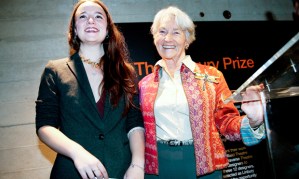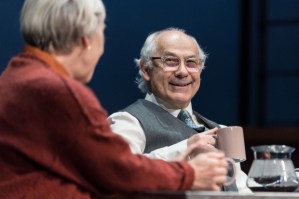Review: A Passage to India (Royal & Derngate)
simple8 presents Simon Dormandy stage adaptation of EM Forster’s novel
At first sight, EM Forster’s 1924 novel seems an anachronism in the 21st century. Its quaint, antiquated approach to British colonialism, and in particular its stance on those pesky 'natives' and their difficult ways, looks decidedly uncomfortable to our modern, ultra-sensitive eyes.
But scratch a little deeper, as theatre company simple8 has done in this co-production with Royal & Derngate, and you can find a tale of sweeping themes, big ideas and dangerous complexities which is all too resonant in our time of global soul-searching.
Adapted and co-directed by Simon Dormandy, this version of the narrative chooses to focus less on the detail of what may or may not have happened to English ingenue Adela Quested in the Marabar Caves and more on the thorny question of how – or indeed whether – conflicting ideologies and cultures can co-exist in any meaningfully harmonious way.
This shift in emphasis aids the whole enterprise enormously: instead of an irritatingly small story about pampered British imperialists disproportionately offended by the locals, we are given a challenging, thought-provoking exploration of different, but equally valid, perspectives. None is deemed to be better or more correct than any other, and the steadfast refusal to take sides offers a neat, timely reflection on the state of the world today.
The adaptation is far from perfect – some of the staging feels gimmicky and tricksy, while the occasional foray into third-person narration breaks the dramatic flow and adds little in the way of insight – but there’s a palpable sense of wanting to use the basic plot as a means to delve deep into much bigger issues.
The production benefits hugely from a 12-strong cast, supplemented by two onstage musicians, who between them manage to create the chaotic, colourful vibrancy of the subcontinent against a simple but extremely effective design by Dora Schweitzer. Kuljit Bhamra’s wonderful score generates buckets of atmosphere and tension while Prema Mehta’s lighting conjures up northern India in all its multi-faceted subtlety.
Liz Crowther nominally heads the cast as Mrs Moore, the enlightened mother of the local British magistrate who accompanies her son’s would-be fiancee on a reconnaissance trip ahead of their anticipated nuptials. Crowther is a commanding presence and linchpin for the production, but she is by no means alone in the quality of her performance.
Edward Killingback pitches his upright but misguided son beautifully, Phoebe Pryce capably pulls off the potentially unbelievable volte-face of Adela, his intended, and Richard Goulding is terrific as the lone colonialist voice willing to side with the accused local doctor Aziz. In this role, Asif Khan delivers servile obsequiousness and seething resentment with equal brilliance, epitomising the unresolvable, ultra-relevant dichotomy at the heart of Forster’s tale: can you somehow find a way to be friends with your enemy?
A Passage to India ran at Royal & Derngate until 20 January, and now tours to Salisbury, Bristol, Liverpool, Bromley and Park Theatre, London.






















